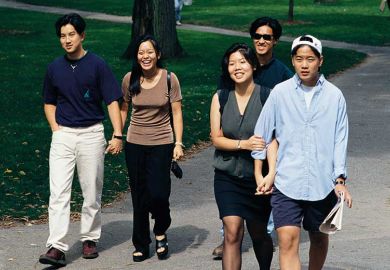A leading civil rights figure in US higher education has warned policymakers off any temptation to attack legacy preferences in college admissions as way of compensating for an expected US Supreme Court ban on affirmative action.
While legacy preferences – favouritism shown to applicants who are children of alumni – have widely been criticised for perpetuating racial inequities, Ruth Simmons argued that alumni are so important to institutions that they deserve some structural encouragement.
Speaking at Times Higher Education’s THE Campus Live US conference in Los Angeles, Professor Simmons said that banning legacy preferences could actually hurt some of the very institutions that do the most to serve diverse student populations.
Historically black colleges and universities typically have meagre endowments, due to centuries of racial inequity. Their use of legacy preference “binds their alumni to them, and enables them to be a stronger institution”, said Professor Simmons, currently the president of Prairie View A&M University in Texas.
The possibility of expanded pressure or outright legislative action to force an end to legacy favours has gained attention in the past couple weeks, after the Supreme Court held a day-long hearing on the question of affirmative action in college admissions.
The nation’s top court is weighing affirmative action in cases involving Harvard University and the University of North Carolina at Chapel Hill. The nine-member court now has a 6-3 majority of conservative justices, and they are widely expected in the coming months to produce a decision reversing the court’s past endorsement of colleges factoring in a student’s race when deciding whether to grant undergraduate admission.
While the court appears to have an ideological split on the wisdom of racial preferences, justices on both sides of that divide suggested during their hearing with Harvard and UNC that any institution claiming a genuine desire to create a racially diverse student body might be hypocritical if it doesn’t first end legacy preferences. That is a particular issue at Harvard, because more than a third of its current freshman class have a relative among its alumni.
Professor Simmons is a former president of Brown University and the first African American leader of an Ivy League institution. She has previously expressed support for Harvard and other private institutions using legacy advantages as a general tool of survival, given the importance of alumni philanthropy.
Addressing the THE event, Professor Simmons made explicit that value for struggling minority-serving campuses. “I don’t want to take away the ability of universities to be able to admit legacies that can help preserve their future,” she said. “Legacies are all about preserving the future of institutions and their stability and their ability to become the institutions fulfilling the missions that they have at the highest possible level.”
The perspective caught some other conference participants off guard, given the wider belief in US higher education that legacy preferences are a net detriment to goals of expanded social equity.
“She made a compelling case,” Terri Gomez, associate provost of student success, equity and innovation at the California State Polytechnic University, Pomona, said shortly after the presentation by Professor Simmons. “I’m sceptical, but I will reconsider.”
Magdalena Hinojosa, senior vice-president for strategic enrolment and student affairs at the University of Texas Rio Grande Valley, called Professor Simmons’s perspective a sign that on the question of legacy admissions, “everybody needs to go back and have a heart-to-heart”.
For institutions that regard themselves as pursuing greater diversity, Professor Hinojosa said, they need to figure out what exactly that goal means to them. “If legacy fits into that profile, then you fit it in,” she said. “And if it does not, then you seriously consider leaving it out.”
Register to continue
Why register?
- Registration is free and only takes a moment
- Once registered, you can read 3 articles a month
- Sign up for our newsletter
Subscribe
Or subscribe for unlimited access to:
- Unlimited access to news, views, insights & reviews
- Digital editions
- Digital access to THE’s university and college rankings analysis
Already registered or a current subscriber?








